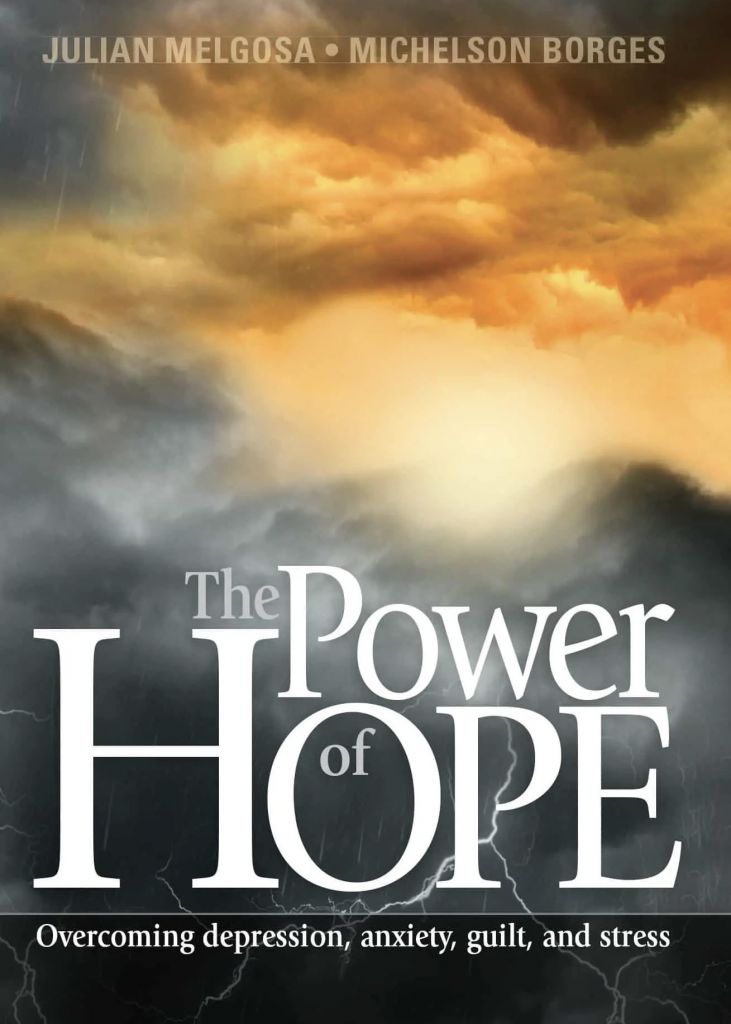After a tense day at work, filled with many problems to solve, numerous e-mails, and telephone calls to return, Paul wanted to get home, eat something, relax on the sofa, and watch just anything on television. However, heavy traffic caused the usual minutes in the car to become hours. It was dark when he arrived home. Entering the house, he immediately took off his shoes, threw his bag in the corner, said a quick hello to his wife, and glanced at his two children, who were playing on the rug. After a warm shower, he put on comfortable clothing and sat at the dinner table.
“Is there anything to eat?” he asked drily.
“Your mother called a while ago. She was complaining that it has been several months since you paid her a visit.”
“She knows I don’t have time for that. I have more to do than go see her. Bills to pay. Problems to solve. And the new supervisor will not leave me alone. What an impossible woman! It seems to me that she’s afraid the company will go broke. It’s really hard to work with her. She’s driving me crazy!”
“This is all you talk about lately—problems, bills, and your supervisor. Did you even notice that your children are there in the living room? All afternoon Mark has been asking what time you would get here.”
“Is it going to be the same thing again, just like every other day? Complaints and more complaints! They hassle me at work, and then you hassle me at home! Do you think it’s easy to support a family with just my salary?”
These last words hit Silvia where it hurt. It was not fair. She had left her job for health reasons, and he knew that. While it was a blessing to spend more time with the kids, listening to her husband’s mocking reminders day after day was becoming unbearable.

“Our children are growing up and they hardly know their father. And I am not even going to mention the state of our marriage!”
“Can’t you just give me some time? I am tired, I have a headache and no patience to have this conversation now.”
At that moment, Paul’s six-year-old daughter handed an envelope to her father.
“Not now, honey! Can’t you see that your mother and I are talking?” Paul snapped.
He stuffed the paper into his pocket carelessly, ignoring his little girl, who slunk away with tear-filled eyes.
“Are you so stupid? Can’t you see what you are doing to your family?”
“I’ve had enough! I’m going to the bedroom. I just lost my appetite.”
Paul felt that he was losing control of his world. The man who used to be secure and self-assured was no longer able to manage his own life. Negative thoughts were taking control of his mind. His brain was in turmoil, and bad memories continually made everything worse. His body was in a state of excessive fatigue because of his lack of physical exercise. His stressed-out supervisor constantly demanded reports from him. All he wanted was some rest and sleep—and maybe he could just never wake up.
When he rolled over on his side, he noticed something in his pocket. Taking out the wrinkled envelope, he opened it and found a note scribbled in crayon. He felt pain in the pit of his stomach as he read the words, “I love you daddy.”

Black hole
Have you ever felt like Paul, swamped by commitments and unable to deal with so many things at the same time? Have you ever felt like throwing in the towel and running away to some deserted place? Perhaps you are lucky and your days go by calmly, without mishap. Right now, millions of people are suffering the effects of anxiety, stress, and depression. These problems have grown increasingly common in our world.
Some time ago, Stephen Hawking, the famous British physicist, made a statement that went viral in the media. His subject was not fantastic theories about different universes. Hawking, who has lived confined to a wheelchair for decades because of a degenerative neurological disease, offered advice to people who suffer from depression.

“The message of this lecture is that black holes ain’t as black as they are painted. They are not the eternal prisons they were once thought. Things can get out of a black hole both on the outside and possibly to another universe. So if you feel you are in a black hole, don’t give up—there’s a way out.”
Stephen Hawking
Perhaps Hawking’s words of encouragement cannot reassure someone like Paul, who is living in a “black hole” of depression, anxiety, and suicidal thoughts.
– Is there really a way out from these problems?
– Is there hope?
– Can a person crawl out of the black holes that this life presents?
The power of thought
The popular saying, “Where there’s a will, there’s a way,” contains a great deal of truth. Every athlete knows that breaking a record is not simply the result of physical preparation but also comes from cultivating the right thoughts in the mind. Likewise, the things we do, the emotions we feel, and even the illnesses we suffer have their origin in our thoughts.
The environment (people, places, and circumstances), personality (optimist or pessimist, suspicious or trusting, talkative or quiet), and memories and experiences are springboards that drive our thoughts. Each person can control their thoughts and direct their will. With the exception of instinctive reactions or repeated actions in our habits, what we do has its origin in our thoughts. Take a look at these three cases:
Prior to meeting with a real estate agent, Morris had not thought about purchasing property. However, the atmosphere of courtesy, the beautiful photos of the available homes, and the easy payment plan encouraged him to consider the possibility of purchase. He went home and thought about the matter. He imagined moving to a larger, more secure residence, with a school in the neighbourhood for the children and easy access to public transportation. Within two days, he signed the contract.
Eloise went out to eat with two old college friends. They had a great time talking about fun memories and about their current situations. Back home, Eloise compared her life to that of her friends. She considered all of the details, remembered the past, and came to the conclusion that her friends were happier than she was. Immediately, depression overtook her as she thought about her own life. Her sad mood continued for several days.
Victoria had a good relationship with almost everyone. Months earlier, she had been in an unpleasant argument with her brother, and they weren’t speaking to each other. She did not want to make peace with him because she had suffered as a result of his insults. When she remembered the misunderstanding, she became upset and felt nauseous.
In all three cases, there is a clear relationship between thought, behaviour, and state of mind. What if Morris, Eloise, and Victoria had changed the course of their thought processes? Probably, the reaction of each one would have been much different.
In any event, we are all in control of our thoughts. And therefore, with greater or lesser difficulty, we can nurture them, guide them, expand them, decrease them, or reject them. Many people know what to do when they feel some physical ailment—a cold, a headache, or stomach ache. However, few people know what to do when they feel anxious, worried, nervous, upset, or impatient. These are toxic states of mind that should be confronted.
How can you identify negative thoughts? How can you know if they will lead you to undesirable behaviour or to a negative state of mind?

To avoid improper thoughts, you should adopt a lifestyle that is guided by moral principles and values, such as honesty, responsibility, justice, respect for others, integrity, and truthfulness. The main idea is to cultivate good values and develop a principled lifestyle that grows gradually. Those who are guided by these ideas end up, naturally and spontaneously, nurturing optimistic and edifying thoughts, with the corresponding beneficial results.
In Mind and Body Health Handbook, researchers David Sobel and Robert Ornstein demonstrate evidence of the benefits of optimistic thought and the feeling of control over some areas of health:
1. Immunological system
Human saliva contains chemical substances that protect us from infections. The levels of protection from these substances are more efficient on days when we feel happy and pleased than on the days when we are sad.
2. Cancer
One group of cancer patients was taught to think in a positive and uplifting manner and to use relaxation techniques. The study showed that the antibodies of these patients became much more active than those in patients who had not received these instructions.
3. Longevity
A group of elderly individuals who resided in assisted living centres were given the freedom to make small decisions (the type of evening meal, choice of the film once a week, etc.). By taking such action, they proved to be happier and more satisfied. After a year and a half, the mortality index of this group was 50 percent less than those who did not have any chance to make choices.
4. Post-surgery
Based on personality data, patients who underwent cardiac surgery were divided into two categories — optimists and pessimists. The optimists recovered more rapidly, suffered fewer complications, and returned to their normal activities sooner than the pessimists.
5. General health
Research participants were asked to make a list of positive and negative events they might face within the next several years. Two years later, the health condition of all participants was examined. Compared to those with a negative point of view, those who had been optimistic about the future had fewer symptoms of illness.
One way to have an optimistic way of thinking is to reject negative thoughts and substitute them with positive options. Often, before he knew it, our friend Paul was thinking of problems at work, his irritating supervisor, his wife’s complaints, and so on. Pessimistic thoughts usually come up automatically and surprise the individual, and they have no logic. Consequently, it is important to identify them and change this type of thought. Optimistic thought must be a constant habit of mental activity. It should cover every aspect of life. These are the areas that need to be considered:

Positive thought about oneself
Do not form your self-concept by comparing yourself to television or movie characters or people from public life. They present an unrealistic image. Recognise your limitations, and do something to improve yourself. Especially, do not forget to emphasize your values and abilities. Reject self-destructive thoughts. Remember the words of Jesus in Luke 21:15: “I will give you words and wisdom that none of your adversaries will be able to resist or contradict.”
Positive thoughts about the past
The past cannot be changed. We should accept even the unpleasant events that took place. Do not blame the past for the difficult situations of today. This is completely useless. Never worry about unpleasant things that happened in the past. Consider the happiness and successes of yesterday, remember and enjoy them, and your attitude will become more positive. Read Paul’s counsel in Philippians 3:13, 14: “But one thing I do: Forgetting what is behind and straining toward what is ahead, I press on toward the goal to win the prize for which God has called me heavenward in Christ Jesus.”
Positive thoughts about the future
The future can be shaped, so your attitude today affects your success of tomorrow. Thinking confidently and having hope will increase your probability of a happier future. And if there is something negative that might happen, plan ahead so that distress will not overwhelm you if it does happen. God promises in Jeremiah 29:11, “I know the plans I have for you, plans to prosper you and not to harm you, plans to give you hope and a future.”

Positive thoughts in relation to environment and people
Put on “tolerance glasses” and observe your surroundings. Although not everything is perfect, you will find some beautiful things and pleasant experiences. Do not judge people but rather respect them and appreciate the good things they do. Seek to understand their problems and help them. In this way, your attitude will bring you satisfaction. Read Philippians 2:3: “Do nothing out of selfish ambition or vain conceit, but in humility consider others better than yourselves.” And also 1 Thessalonians 5:11: “Therefore encourage one another and build each other up.”
Sometimes people allow themselves to become controlled by illogical thoughts. These thoughts cause unhappiness and obstacles. Here are some examples:
– We are surrounded by constant dangers and risks, and it is natural for us to be worried and afraid.
– People who are needy and unhappy cannot do anything to improve their situation.
– To be happy and live at peace with myself, I need to feel the approval and love of everyone who knows me.
– There is always a perfect solution for every problem, and if this solution is not reached, the consequences will be devastating.
The statements above are deceitful. Agreeing with them can bring about psychological pain and unhappiness. You should make an effort to identify and analyse your erroneous thoughts. Think carefully so that you can reject them and accept better alternatives.
Control your mental tendencies
Because of our friend Paul’s poor quality of life, his thoughts and feelings became increasingly negative. While his physical and emotional issues were the result of a series of factors, much of the unpleasant atmosphere surrounding him had to do with his inner dialogue. If his exterior relationships were not going well, his relationship with himself was even worse.
Frequently, individuals have a generalized tendency for positive or negative thoughts. For the most part, this tendency depends on the style of inner dialogue that is continual and automatic. Recognising the type of dialogue we carry on with ourselves becomes indispensable so that bad thought habits can be abandoned and positive alternatives can be sought to help resolve these situations. Look at Paul’s thoughts and think about possible alternatives:
Negative self-dialogue:
– “All of this is horrible.”
– “I cannot resolve anything.”
– “My life is worthless.” “I am losing my family.”
Alternative:
– “Things are bad, but they could be worse.”
– “Perhaps, with some effort and patience, I can resolve one thing at a time.”
– “Not everything is perfect, but there are good things in my life.”
– “If I dedicate a little more quality time to my family, I can improve our relationship.”
There are people who believe that joy and happiness come about by chance, that these are influenced by circumstances or are a matter of luck. However, most often, joy and happiness are personal choices. Being happy is an option. Some people prefer to be unhappy, but everyone can choose to be an optimist and enjoy a reasonably happy life. Simple choices, if made with determination, can provide much enthusiasm and prevent discouragement.
Look at some examples of things you can say:
– “I decided that I am going to be happy”;
– “Today I will be contented and I will not allow discouragement to take ahold of me”;
– “I am going to look at the bright side of things”;
– “Even if my supervisor tries to ruin my day, I will not allow myself to get upset.”

Being happy and enjoying a life filled with happiness and optimism is a desirable objective. This is achieved through one’s own initiative.
Optimistic thought is an excellent option for preserving our mental health and reaching our goals. However, we cannot believe that everything is resolved through thought alone. Optimism, although useful, is limited in certain circumstances: the death of a loved one, a natural disaster, or a serious medical diagnosis. In practice, it is impossible to have optimistic thoughts when we are very bitter or in a critical situation. Positive thought can even become deceitful and in some cases make us lose sight of certain sad realities.
The content of this post is taken from The Power of Hope — Overcoming depression, anxiety, guilt, and stress, authored by Julián Melgosa and Michelson Borges.
Julián Melgosa holds a doctorate in educational psychology from Andrews University. A member of the British Psychological Society, he was a university professor and is the author of various articles and books in the area of emotional health.
Michelson Borges is a journalist with a master’s in theology from Brazil Adventist University. He is the editor of “Vida e Saúde” (Life and Health magazine), is a seminar presenter and has authored books on media, science and religion.





